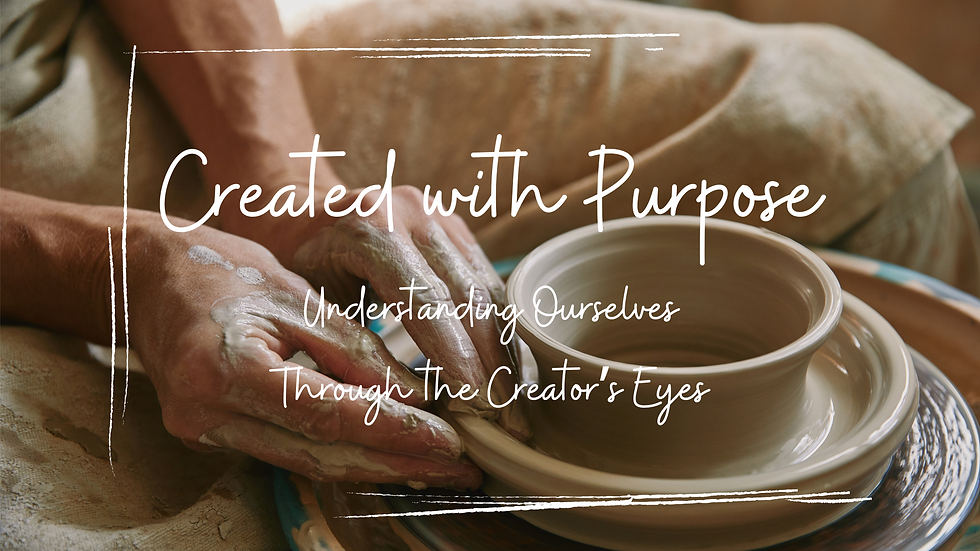God Communicates Through Our Emotions to Bring About Growth and Transformation
- Tobias Wade

- Sep 29, 2025
- 4 min read

For the sorrow that is according to the will of God produces a repentance without regret, leading to salvation, but the sorrow of the world produces death. 2 Corinthians 7:10 NASB
We have all reflected upon situations in our lives and realised that our emotions overcame us, our thoughts overwhelmed us, our perceptions were inaccurate, our judgements flawed, and our actions and decisions were undesirable. Upon these realisations, we can experience strong emotions such as sorrow, remorse, or regret.
“Perhaps one of the most important things the bible tells us about our emotions is that they are an expression of what we value or love.” Groves and Smith – Untangling Emotions[i]
Emotions communicate valuable information to us about ourselves, including what we value and love. How we interpret this information is important, because as Paul tells us we can interpret our emotions (e.g. sorrow) in one of two ways. We can interpret our emotions in a way that is aligned with God’s will, producing a change of mindset, and thus growth and transformation, or in a way that is counter to God’s will and leads us to remain fixed in our current mindsets and behaviours.
Our emotions are frequently manifested through our behaviours, the fruit of an internal tree of values, beliefs, and attitudes, which extend down to the foundational roots of our internal tree: our mindsets.
For example, imagine you are in a group situation and become angry at a friend and you begin yelling hurtful things at them. Upon reflection you experience sorrow, regret, and remorse. These emotions then lead you to realise that you have behaved in an undesirable manner, and you apologise to your friend seeking forgiveness, as you try and repair the relationship.
This is because sorrow, regret and remorse can lead us to the realisation that we have behaved in an undesirable manner and lead us to seek forgiveness for our behaviours. This is positive because God wants us to apologise and seek forgiveness when we have hurt someone we care about.
God also wants something deeper from us, repentance, which means to change our mind.
We can change our minds at a superficial level or at deep level. Acknowledging that our behaviours were undesirable and seeking forgiveness is changing our minds at a superficial level, because it fails to explore what led to the undesirable behaviours in the first place.
In the example I gave above, the emotion that led to the undesirable actions was anger. If I want to change my mind, to change the mindsets that led to the fruit of anger in my heart and its expression through my behaviours, I need to understand what the anger was communicating to me.
This is important, because God communicates through our emotions the values, beliefs, and mindsets that we need to change for grow and transformation.
Anger is an intense emotion that arises when something we value, or love has been threatened or compromised. For instance, if an individual values control and experiences a loss of control in a situation, they may display angry towards others. Similarly, if a person values respect and perceives disrespect, they may express anger towards the person perceived as being disrespectful.
When we start to reflect on our emotions at a deeper level, God begins to communicate through them to bring about growth and transformation.
Transformation happens when God’s will and our will are united. To experience growth and transformation, we need to explore what God communicates through our emotions about His will for our lives.
This requires us to develop the desire and skills necessary for us to control our emotions rather than letting them control us.
When we are feeling overwhelmed by our emotions, we need to take the time to ask God what He is trying to communicate to us.
Sometimes this can be hard to achieve, and our emotions will get the better of us. This is where taking the time to practice self-reflection is important.
In our resources section there is a self-reflective exercise that can be downloaded called “What Are My Emotions Communicating to Me?” Why not download it and give it a go!
By practicing mindfulness and self-reflection, we can learn to discern what God is communicating to us through our emotions and begin to take control of them instead of letting them control us. When we do, we will begin to experience growth and transformation in our lives.
Reflection
What emotions do you feel the most and what are they communicating to you about what you love?
Prayer
Father God, help me to better understand my emotions and what they are communicating to me. Help me to sit with them regardless of how uncomfortable they are and help me explore them with you so that I can better understand what they are communicating to me.
Affirmation
My emotions are neither good nor bad, they are just feelings communicating important information to me.
Action
The next time you experience a very intense emotion, try sitting with it and breathe into it. Imagine as you breathe in and out, that your breath is moving around the emotion. As you do this try and identify what emotion you are feeling. Then ask yourself what this emotion is trying to communicate to you. Finally, make a plan of how you are going to respond to this emotion in accordance with your values.
[i] Groves, J. Alasdair, and Winston T. Smith. Untangling Emotions. Wheaton, Illinois: Crossway, 2019.